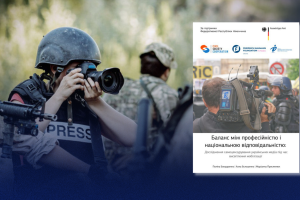Ukraine turns 29. Where are we now, and what is our way? Results of the nationwide opinion poll
The survey was conducted by the Ilko Kucheriv Democratic Initiatives Foundation in cooperation with the Razumkov Center sociological service from August 14 to 19, 2020, via face-to-face interviews at the respondents' place of residence. 2018 respondents aged over 18 y.o. were interviewed in all regions of Ukraine, except for Crimea and the occupied territories of Donetsk and Luhansk oblasts, based on a sample representative of the adult population. The theoretical sampling error does not exceed 2.3%. The survey was funded within the MATRA project of the Embassy of the Kingdom of the Netherlands.
The press conference "Political Quarterly: Summer 2020" was conducted by the Ilko Kucheriv Democratic Initiatives Foundation as a part of USAID/ENGAGE activity, funded by the United States Agency for International Development (USAID) and implemented by Pact in Ukraine. The content of the event is a complete responsibility of Pact and its partners and does not necessarily reflect the views of the USAID or the US Government.
• The majority of Ukrainians are convinced that the overall situation in the country is developing in the wrong direction - 59%. Only 19% have the opposite opinion and believe that the situation is moving in a positive direction. Such negative assessments are traditional for Ukrainian society. Some bursts of positive assessment are observed only in the short period after the presidential election.
• In this aspect, there are clear differences depending on the age of the respondents: the younger the respondents are - the more positive assessments of the situation in the country can be expected. Thus, among young people, the level of positive assessments is 33%, and among people over 60 - only 11%. Among the voters of different parties, only the electorate of the "Servant of the People" party demonstrates the high level of belief in the correctness of the vector of development - more than 55% of representatives of this group demonstrates positive assessments.
• Despite falling ratings, the pro-presidential Servant of the People party remains the sole leader of the electoral sympathies: if parliamentary elections were held this Sunday, almost 30% of those who voted would go to the polls. The number of Opposition Platform "For Life" sympathizers has slightly increased - today almost 22% of voters are ready to vote for it. The third place is held by the"European Solidarity" with a little less than 16%, and the Batkivshchyna (Fatherland) party has more than 11%. Slightly below the electoral threshold is the"Strength and Honor" party, with 4.6%. Other parties, such as the Lyashko Radical Party, the Shariy Party, the Svoboda, and the Voice, are well below the electoral barrier and would not be elected for the Verkhovna Rada today.
• Electoral preferences directly depend on the age and the region of residence of respondents. Thus, the "Servant of the People" receives much more votes among younger respondents - 6 out of 10 voters under the age of 40. In contrast, "Opposition Platform – For Life" is supported mostly by pensioners. 7 out of 10 of "Opposition Platform - For Life" voters are over 50 years old, and almost half are over 60 years old. Half of all of them reside in the East of Ukraine. The European Solidarity, on the other hand, demonstrates a radically different picture: virtually all of the party's voters live in the West and the Center of the country, and less than 14% of all those going to vote for the European Solidarity live in the East and South.
• If the referendum on the proclamation of Ukraine's state independence took place today, it would definitely be won for the supporters of independence. So the votes on it would be distributed 84.4% - "FOR" and 15.6% - "AGAINST". If we are taking into the account the respondents who hesitate to answer or would not go to the referendum, then less than 13% of citizens would oppose, and almost 68% would vote for independence. Support for independence in a conditional referendum is the most popular option in all regions, age groups, and among supporters of all major political parties.
• At the same time, despite such absolute support for independence, there are significant regional, age, and party differences. Thus, in the West, there is less than 1% of opponents of independence, and in the East, this number is almost 30%. There is also a tendency - the younger the respondents - the more supporters of the decision on independence among them. Among supporters of political parties - the highest level of support for independence is among the "European Solidarity" electorate - more than 90%. The smallest- among "Opposition Platform – For Life" voters, among this group it is just slightly larger than the number of those who would prefer Ukraine to remain part of the USSR.
• However, despite the high level of support for independence, there is a noticeable number of people who remain nostalgic for the Soviet Union. Almost 32% perceive the fact of the collapse of the Soviet Union negatively. 49% of respondents hold the opposite opinion. The rest are hesitant to answer.
• While answering the question, "Which events prevail in the history of independent Ukraine: positive or negative?" respondents' opinions divided almost equally.
About a quarter of respondents believe that there were more positive events. Also, a quarter is convinced that there was more negativity. The largest share (over 40%) believe that during the years of independence, there were about as many positive events as negative ones.
• This question also unveils significant regional and age differences. Young people believe that there was more positivity; the older population tends to have a polar position. In the regional dimension, the least positive assessments are in the East, and the most positive ones are in the West.
• The vast majority of respondents prefer to build their future lives in Ukraine - about 70%. Instead, 19% would rather want to build their lives elsewhere. However, there is an alarming aspect. The largest share of those who would like to build their lives abroad is young people under 40.
• More than half of the respondents did not think about leaving the country and are going to live and work in Ukraine. However, a significant part of the respondents is considering the possibility of leaving. The main reasons: the opportunity to earn more money abroad (22%), the unstable political situation in Ukraine (13%), and unsatisfactory living conditions in Ukraine (13%).
SOVEREIGNTY AND THE REINTEGRATION OF DONBAS
The survey was conducted by the Ilko Kucheriv Democratic Initiatives Foundation in cooperation with the Razumkov Center sociological service from July 3 to 9, 2020, via face-to-face interviews at the respondents' place of residence. 2022 respondents aged over 18 y.o. were interviewed in all regions of Ukraine, except for Crimea and the occupied territories of Donetsk and Luhansk oblasts, based on a sample representative of the adult population according to the key socio-demographic indicators. The theoretical sampling error does not exceed 2.3. The survey was funded within the MATRA project of the Embassy of the Kingdom of the Netherlands.
• 59% of "Opposition Platform - For Life" voters unconditionally support the adoption of the law on the "special status" of SDDLR. However, voters of all other parliamentary parties, including the Servant of the People, have significant reservations about passing such a law. In total, more than half of the respondents chose options with the introduction of a peacekeeping mission in SDDLR, restoration of the Constitution and laws of Ukraine in these territories, as well as the position that this territory cannot have a "special status" under any circumstances. ). Only 34% are ready to support "Special status" and elections in ORDLO for the sake of Donbas reintegration. Among the electorate of the "Servant of the People," 29% support this idea.
• For the sake of peace in Donbas, Ukrainians are ready to make compromises, but not all of them. Thus, about half of the respondents believe that such compromises should be acceptable for Ukraine and only 20% are ready to make any compromises for the sake of peace. Among the voters of different parties, the voters of "Opposition Platform - For Life" demonstrate high support to compromise, as expected. Voters of all other political parties, including "Servant of the People", prefer to be more careful about concessions that Ukraine can agree to.








